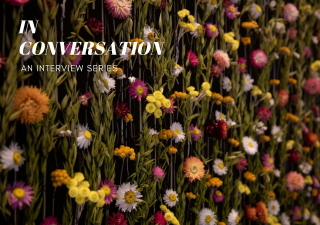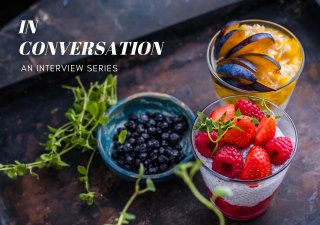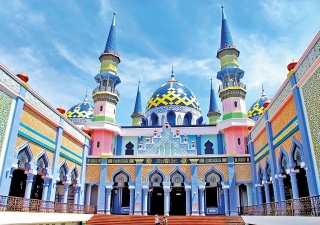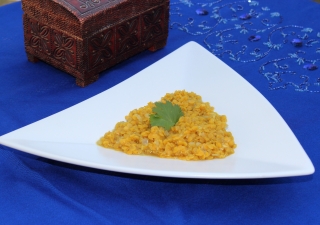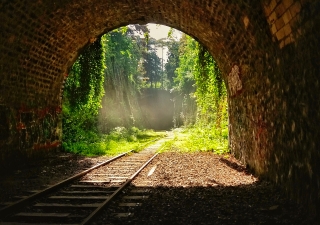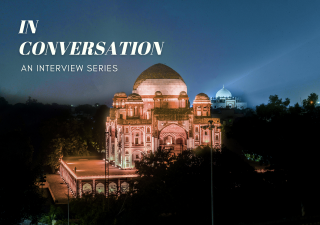Features
Making Paradise: Exploring the Concept of Eden through Art and Islamic Garden Design is the latest exhibition at the Aga Khan Centre Gallery in London, UK. In this interview, its curator Esen Salma Kaya gives an insight into the multi-sensory show, the diverse artists involved, and planning it “from the heart.”
From the very beginnings of Islam, the search for knowledge has been a central tenet. With the role of science and technology becoming indispensable in the current era, it is important to keep up with current advancements and understand the significance of these fields in our daily lives. Science and Technology Unleashed is an original The Ismaili TV series which premiered in 2020 and is designed to expose the wonders of science in a thought-provoking, educational, and entertaining way.
In this interview with The Ismaili, Azmina Govindji discusses nutrition and healthy eating for better physical and mental health, and shares advice on how to adjust lifestyle choices to enjoy a better quality of life.
Are you curious to learn more about Islamic history, culture, and societies? The Institute of Ismaili Studies (IIS) publishes a wide range of books that explore some of the diverse manifestations of Islam. This guide, in celebration of World Book Day, suggests a few good places to start.
Ever wonder why our parents tell us to drink milk with turmeric and saffron when we are fighting a cold? Or why so many diverse spices are added to our foods to add flavour and more? Our cultural foods — whether from Central Asia, South Asia, or the Middle East — have a beautiful history, but they can also be perceived as unhealthy. While some dishes do indeed cause concern, many are healthy or can be made healthy with some simple tweaks.
Grains are a basic food in households around the world and can be broken down into two categories: whole grains and refined grains. Unlike the refined grain, the whole grain kernel or the seed has all three parts intact: the bran, germ, and endosperm. Each one of these parts offer health promoting benefits. The bran, which is the outermost layer, contains the fibre, B vitamins, iron, copper, zinc, magnesium, and antioxidants. The germ is the centre most part of the seed and it is loaded with healthy fats, vitamin E, B vitamins, phytochemicals, and antioxidants. The endosperm is the innermost layer that holds the carbohydrates, protein, and small amounts of B vitamins.
Hidden among the bustling streets of South Mumbai and its sprawling skyline lies a haven of solace and peace: Hasanabad. Often described as ‘Mumbai’s Taj Mahal’, the monument is a mausoleum or dargah: the final resting place of Imam Hasan Ali Shah, the 46th Imam of the Shia Ismaili Muslims.
Last March, the World Health Organization declared the coronavirus outbreak to be a global pandemic. After 12 months of mixed emotions and disruption to our lives, what have we learned, and where do we go from here?
I always saw the Medical College Admission Test (MCAT) as a daunting exam; nevertheless, the fact that so many students would be taking it with me physically gave me some sense of moral support, even if that support was coming from strangers.
Many aspects of our daily lives can cause stress and coping with these stresses is an important element of maintaining our mental wellbeing. One of the leading causes of stress is financial circumstance. Many people are dealing with job loss, increasing debt, and unexpected expenses, especially during this time of uncertainty. Here are five tips to assist you in coping with financial stresses.
The Ismaili is pleased to publish an interview with Shiraz Allibhai, Deputy Director of the Aga Khan Trust for Culture. As part of a series of conversations with key figures, Mr Allibhai discusses the positive impact of culture and its development potential, and humanity’s shared responsibility to preserve heritage.
Welcome to The Ismaili Magazine 2020: A Year of Extraordinary Service. This digital magazine provides a whistle-stop tour across continents, highlighting the various programmes, initiatives, and events organised by AKDN and Jamati institutions around the world over the past 12 months.

